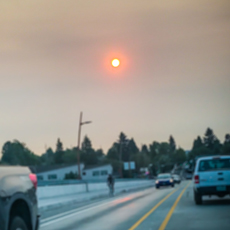
Like it had just pulled an emergency triple-shift, while simultaneously serving as DON, CNA, cook, laundry assistant and defense attorney.
That’s how the sun looked as I drove to work Tuesday morning after the eclipse. Bloodshot. Exhausted. Barely able to keep its eye open. I wanted to stop the car and give it a hug.

It’s easy to empathize. You’ve probably been in a similar situation yourself, where you’re trying to shine your warm and nurturing presence on your facility staff or colleagues, and then some undeserving attention-seeker steps between and soaks up all the spotlight. It’s frustrating and wearisome. I feel for the sun.
Along with a group of coworkers, I viewed Monday’s eclipse from a strip of lawn outside our office building. Either we were too committed to our jobs serving the aging population of America, or just too lazy to fight the traffic required to get a few miles south into the zone of totality, so we opted to settle for the 99.4% lunar coverage to which we were geographically entitled.
Like any self-respecting modern, I made my own Spotify playlist — and no, it did not include “Total Eclipse of the Heart” — so I slipped into my earbuds, sat down in the grass, tipped my head back and settled in for the show. (Oh, and I also put on my special glasses before looking up, unlike a certain President I know)
By any standard, the supernatural event was amazing — the way the moon slowly consumed the sun, the sudden drop in temperature, the metallic end-of-the-world sheen on everything. I can’t get enough of the photos I’ve seen of nursing home residents watching the sky, awe-struck mouths agape, and my own jaw might have dropped a couple times. But apparently it still wasn’t sufficient, and here’s what I learned: We humans can be an ungrateful species.
As the famous astronomer Mark Twain warned, that 0.6% of missing totality ended up being the difference between a lightning bug and lightning. Or as Annie Dillard put it, “Seeing a partial eclipse bears the same relation to seeing a total eclipse as kissing a man does to marrying him.” So it’s not like we weren’t warned.
Even though we knew it wasn’t going to happen (because: science), when the sky didn’t get completely dark and cows didn’t return to the barn, I detected a rising swell of almost angry disappointment around me. “Well, that was anticlimactic,” said one co-worker. “Seriously, was that it?” murmured another dozen or two, perhaps even including me.
We were at 99.4%, and yet not nearly close enough to meet the expectations of my group of aggrieved spectators. It’s all a matter of perspective. A reduction of 99.4% in antipsychotic use would have evoked high-fives at stand-up and ice cream in the break room. But when the eclipse didn’t deliver on that final 0.6%, we were demanding refunds, posting angry reviews on the sun’s Yelp page and exploring legal options to sue the solar system.
Three days later, our emotions have cooled. But though we’re starting to feel a sense of healing compassion for the sun, the harsh truth is that its best just wasn’t good enough. So we’re docking its rating a star, and expecting a written plan for getting us to totality next time.
Things I Think is written by Gary Tetz, a national Silver Medalist and regional Gold Medal winner in the Association of Business Press Editors (ASBPE) awards program. He has amused, informed and sometimes befuddled long-term care readers worldwide since his debut with the former SNALF.com at the end of a previous century. He is a multimedia consultant for Consonus Healthcare Services in Portland, OR.




